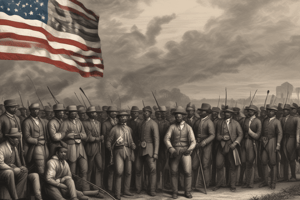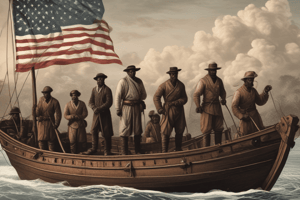Podcast
Questions and Answers
Which of the following was a provision of the Compromise of 1850 that favored the North?
Which of the following was a provision of the Compromise of 1850 that favored the North?
- No slave trade was allowed in Washington D.C. (correct)
- California was admitted to the Union as a slave state.
- The Fugitive Slave Act was abolished.
- Utah and New Mexico were granted popular sovereignty. (correct)
What was the main issue that led to the writing of Uncle Tom's Cabin?
What was the main issue that led to the writing of Uncle Tom's Cabin?
- The author wanted to expose the harsh realities of slavery in the South. (correct)
- The author was opposed to the Mexican-American War.
- The author was concerned about the treatment of slaves in the North.
- The author was a strong supporter of the Kansas-Nebraska Act.
Which of the following best describes the outcome of the Kansas-Nebraska Act?
Which of the following best describes the outcome of the Kansas-Nebraska Act?
- The act led to the immediate abolition of slavery in the United States.
- The act resulted in the establishment of two new free states in the Union.
- The act was widely popular among both Northerners and Southerners.
- The act led to mini wars breaking out in Kansas for two years. (correct)
What was the main purpose of the Gadsden Purchase?
What was the main purpose of the Gadsden Purchase?
Which of the following candidates in the 1856 election was opposed to the expansion of slavery?
Which of the following candidates in the 1856 election was opposed to the expansion of slavery?
What was the main goal of the Free Soil Party in the 1848 election?
What was the main goal of the Free Soil Party in the 1848 election?
Which of the following was a consequence of the Fugitive Slave Act?
Which of the following was a consequence of the Fugitive Slave Act?
What was the main reason why Southerners wanted to ban Uncle Tom's Cabin?
What was the main reason why Southerners wanted to ban Uncle Tom's Cabin?
What was the primary argument made by Dred Scott in his court case?
What was the primary argument made by Dred Scott in his court case?
What was the main difference between Lincoln's and Douglas' views on slavery?
What was the main difference between Lincoln's and Douglas' views on slavery?
What was the result of John Brown's raid on Harper's Ferry?
What was the result of John Brown's raid on Harper's Ferry?
What was the primary reason for the South's secession from the Union?
What was the primary reason for the South's secession from the Union?
What was the significance of the Wilmot Proviso?
What was the significance of the Wilmot Proviso?
What was the primary outcome of the Dred Scott Decision?
What was the primary outcome of the Dred Scott Decision?
What was the main ideological difference between the North and the South?
What was the main ideological difference between the North and the South?
What was the significance of the Lincoln-Douglas Debates?
What was the significance of the Lincoln-Douglas Debates?
Flashcards are hidden until you start studying
Study Notes
Compromise of 1850
- California admitted as a free state, favoring the North
- No slave trade in Washington D.C., but slavery remains legal
- Federally enforced Fugitive Slave Act, requiring slaves to be returned to their owners, even in free states
- Utah and New Mexico territories granted popular sovereignty, favoring the North
Election of 1848
- Lewis Cass (Democrat) advocated for popular sovereignty
- Zachary Taylor (Whig) avoided the topic of slavery and won the election, but died soon after, and VP Fillmore took over
- Martin Van Buren (Free Soil Party) opposed the expansion of slavery into new states
Uncle Tom's Cabin
- Written by Harriet Beecher Stowe in 1852, from the perspective of a slave family
- Southerners wanted to ban the book as it made them look bad and hurt their economy
- Stowe's second book, "A Key to Uncle Tom's Cabin" (1854), provided more credibility to her claims
"Bleeding" Kansas
- Kansas-Nebraska Act (1854) allowed popular sovereignty in the two states
- Abolitionists and pro-slavery settlers moved to Kansas to influence the vote
- Mini wars broke out in Kansas for two years, with the federal government failing to intervene
Gadsden Purchase
- The US purchased desert land from Mexico for $10 million in 1853, with the intention of building a transcontinental railroad
- The railroad was never built in this area
Election of 1856
- John Fremont (Republican) opposed the expansion of slavery
- Millard Fillmore (American Party) opposed immigration and won the election
- James Buchanan (Democrat) advocated for popular sovereignty, but his view on slavery was irrelevant due to Congress' power
Dred Scott Decision
- Dred Scott, a slave, claimed to be a free man after being brought to Minnesota, but the court ruled against him
- The court decided that only federal citizens have the right to be in federal court, and that slavery cannot be limited by Congress
Lincoln & Douglas Debates
- Abraham Lincoln (Republican) opposed the expansion of slavery, while Stephen Douglas (Democrat) advocated for popular sovereignty
- Lincoln won the series of debates, but Douglas won the election, putting Lincoln in the national spotlight
John Brown
- John Brown was a radical abolitionist who believed he was ordered by God to end slavery
- He planned to start a slave rebellion in Virginia, but was caught and arrested at Harper's Ferry in 1859
- Brown was hanged, becoming a martyr for the abolitionist movement
Civil War
- The South threatened to secede if Lincoln won the 1860 election, which he did
- The Republicans' stance on limiting slavery's expansion violated the Constitution, according to the Dred Scott decision
- The South felt that their natural rights weren't being protected, leading to the formation of the Confederacy
- The North opposed secession to maintain the Constitution and Manifest Destiny
Studying That Suits You
Use AI to generate personalized quizzes and flashcards to suit your learning preferences.




